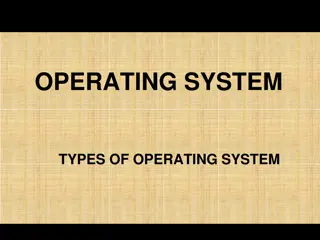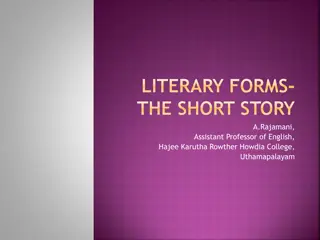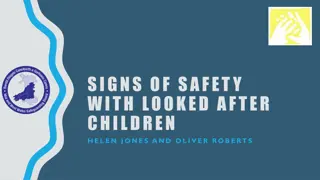Understanding the Danger of a Single Story
Exploring the TED Talk "The Danger of a Single Story" by Chimamanda Adichie highlights how relying on a singular narrative can lead to stereotypes and misconceptions, hindering genuine connections and perpetuating power imbalances. Adichie's insights shed light on the importance of embracing diverse perspectives and narratives to avoid oversimplified judgments.
Uploaded on Jul 17, 2024 | 0 Views
Download Presentation

Please find below an Image/Link to download the presentation.
The content on the website is provided AS IS for your information and personal use only. It may not be sold, licensed, or shared on other websites without obtaining consent from the author. Download presentation by click this link. If you encounter any issues during the download, it is possible that the publisher has removed the file from their server.
E N D
Presentation Transcript
The Danger of a Single Story 14th September 2020
Learning Objectives (BC Curriculum) 1. I can identify periods of progress and decline, and identify key turning points that marked periods of continuity or change. 1. I can assess the significance of people, places, events, or developments at particular times and places. 1. Learning about Inequality issues and treatment of minority populations in the US and Canada.
The Danger of a Single Story [Background for Staff] The Danger of a Single Story , a 2009 TED Talk by Chimamanda Adichie, a young Nigerian author, provides a powerful tool for the Facing History classroom. In the twenty minute video, Adichie describes the powerful impression the multitude of British stories made on her as a young girl growing up in Nigeria. She argues that inherent in the power of stories, is a danger the danger of only knowing one story about a group. The single story creates stereotypes, and the problem with stereotypes is not that they are untrue, but that they are incomplete. They make one story become the only story.
The Danger of a Single Story [Background for Staff] Adichie recounts speaking to an American student who, after reading her novel centered on an abusive male protagonist, lamented the fact that Nigerian men were abusive. Having just read American Psycho, Adichie returns his pity, and calls it a shame that all young American men are serial killers. The TED audience laughs at the absurdity of this generalization and her point is clear: on a micro-level, the danger of a single story is that it prevents people from authentically connecting with people as individuals. On a macro-level, the issue is really about power: almost by definition, there are many stories about the dominant culture so the single-story threatens to create stereotypes that stick to groups that are already disempowered.
The Power of a Single Story Spend five minutes doing a free-write (journal-entry) about the above heading: The Power of a Single Story. Write about whatever comes to mind. Do not worry too much about correct grammar or spelling - just let your thoughts flow.
The Power of a Single Story Does anyone want to share thoughts on their free- write?
TEDTalk - The Danger of a Single Story We are going to watch a video entitled The Danger of a Single Story by Chimamanda Ngozi Adichie. (20 mins) As you watch the video, listen and record the main points that Adichie makes.
The Danger of a Single Story [Gr. 6-7] 1. In which country did Adichie grow up? 2. At what age did her mother claim Adichie started reading? 3. Which countries were the books she first read from? 4. When she started writing, what four features did Adichie s characters have? 5. Why were these features unusual? 6. Which two writers affected her opinions of literature? 7. Why did Adichie love the American and British literature she read? 8. Why did Adichie feel that African writers saved her? 9. Why did visiting Fide s family change Adichie s perspective? 10.When was Adichie also guilty of only seeing a single story?
The Danger of a Single Story [Gr. 6-7] 1. In which country did Adichie grow up? Eastern Nigeria 2. At what age did her mother claim Adichie started reading? 2 3. Which countries were the books she first read from? Britain and America 4. What four features did Adichie s characters have? White, blue- eyed, played in the snow, ate apples, talked about the weather. 5. Why were these features unusual? She lived in Nigeria, had never seen snow, ate mangoes not apples, did not experience varied weather like in Britain or some parts of America.
The Danger of a Single Story [Gr. 6-7] 1. Which two writers affected her opinions of literature? Chinua Achebe and Camara Laye 2. Why did Adichie love the American and British literature she read? They sparked her imagination/they opened up new worlds. 3. Why did Adichie feel that African writers saved her? They helped her realise that girls like her could also exist in literature. 4. Why did visiting Fide s family change Adichie s perspective? She saw his family as more than just poor when she realised they could make beautiful things. 5. When was Adichie also guilty of only seeing a single story? When she visited Mexico.
The Danger of a Single Story [Gr. 8] Overall, what do you think Adichie is saying is the danger of a single story? How does this compare to what you wrote earlier in the free write session about the power of a single story? Can you think of any more examples of the dangers of only knowing the single story of a person or place?
The Danger of a Single Story [Gr. 9-10] Find an example of a single story and reflect on the ways it has impacted your understanding of a particular event; historical or contemporary / personal or public. Share your single story in pairs. Class Discussion: Were your examples... a) Single stories about other people, places or things? b) Single stories people have about themselves? Question: Which stories tend to prevail and become the one story and why?
Reflection Some questions to think about when we read or hear people s stories this year are: 1. Who writes the stories? 2. Who benefits from the stories? 3. Who is missing from the stories?























